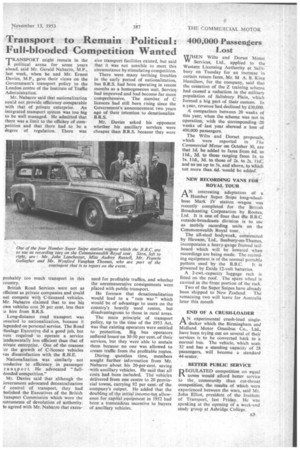Transport to Remain Political: Full-blooded Competition Wanted
Page 85

If you've noticed an error in this article please click here to report it so we can fix it.
TRANSPORT might remain in the 1 political arena for some years ahead, said Mr. Gerald Nabarro, M.P., last week, when he and Mr. Ernest Davies, M.P., gave their views on the Government's transport policy to the London centre of the Institute of Traffic Administration.
Mr. Nabarro said that nationalization could not provide efficiency comparable with that of private enterprise. An integrated transport system was too big to be well managed. He admitted that there was a limit to the efficacy of competition and that there had to be a degree of regulation. There was probably too much transport in this country.
British Road Services were not as efficient as private companies and could not compete with C-licensed vehicles. Mr. Nabarro claimed that to use his awn vehicles cost 20 per cent. less than :o hire from B.R.S.
Long-distance road transport was insulted to nationalization, because it lepended on personal service. The Road Haulage Executive did a pod job, but vere required to operate a service 'undamentally less efficient than that of nivate enterprise. One of the reasons or the growth of C-licence vehicles vas dissatisfaction with the R.H.E. Nationalization was similarly not .onducive to efficiency in passenger r a n sp or t. He advocated " fullaooded competition."
Mr. Davies said that although the iovernment advocated decentralization ,f control of transport, they had bolished the Executives of the British 'ransport Commission which were the nstruments of devolution of authority. le agreed with Mr: Nabarro that exces
sive transport facilities existed, but said that it was not sensible to meet this circumstance by stimulating competition.
There were many teething troubles in the early period of nationalization, but B.R.S. had been operating in recent months as a homogeneous unit. Service. had improved and had become far more comprehensive. The number of C licences had still been rising since the Government's announcement two years ago of their intention to denationalize B.R.S.
Mr. Davies asked his opponent whether his ancillary services were cheaper than B.R.S. because they were used for profitable traffics, and whether the unremunerative consignments were placed with public transport.
He foresaw that denationalization would lead to a "rate war" which would be of advantage to users on the country's heavily used routes, but disadvantageous to those in rural areas.
The main principle of transport policy, up to the time of the 1953 Act, was that existing operators were entitled to protection. Big bus operators suffered losses on 30-50 per cent, of their services, but they were able to sustain them because no one was allowed to cream traffic from the profitable routes.
During question time, members sought further information from Mr. Nabarro about his 20-per-cent. saving with ancillary vehicles. He said that all costs had been included. The vehicles delivered from one centre to 20 provincial towns, carrying 92 per cent., of the company's output. He added that the doubling of the initial income-tax allowance for capital equipment in 1952 had been a tremendous incentive to buyers of ancillary vehicles.












































































































































































































































